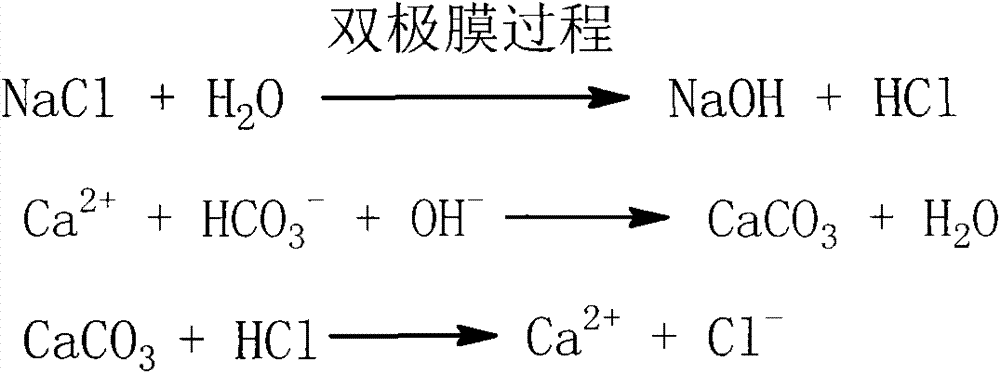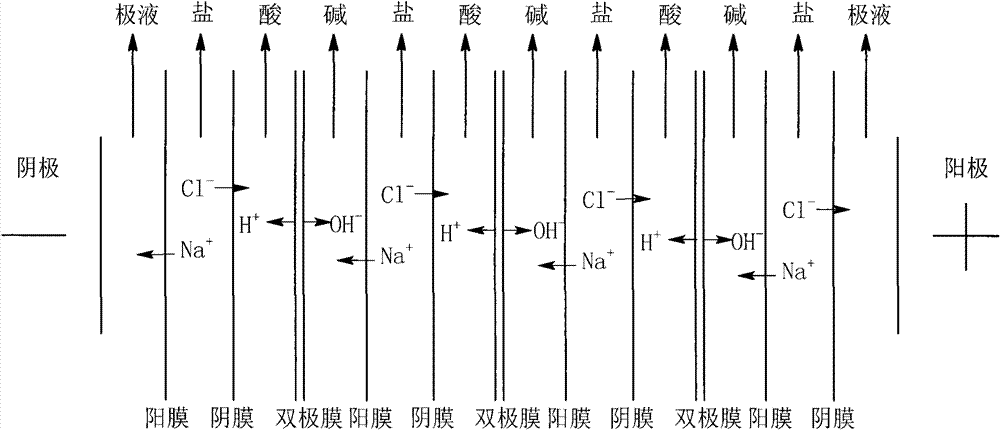Method for adjusting quality of water produced by desalting sea water by reverse osmosis method by using bipolar membrane
A reverse osmosis, bipolar membrane technology, applied in the field of chemical treatment, can solve problems such as unsatisfactory and unstable conditioning effect, and compliance with standards during conditioning
- Summary
- Abstract
- Description
- Claims
- Application Information
AI Technical Summary
Problems solved by technology
Method used
Image
Examples
Embodiment 1
[0027] The seawater that has undergone flocculation, sedimentation and sand filtration is used as the influent, and the bipolar device is a BMP2-500 device, with 40 bipolar membranes of 200*400, and 40 pairs of one-bivalent separation membranes for the anion membrane and the anode membrane, 80 A 200*400 elastic separator, the negative electrode is a titanium-coated ruthenium electrode, and the anode is a platinum electrode. The current density adopts 1000A / m 2 , the flow velocity on the membrane surface is 5cm / s, 3% sodium sulfate solution is used as the polar liquid, and the concentration of the acid solution in the acid chamber or the lye in the alkali chamber reaches about 10% by means of partial circulation. Flow the acid solution in the acid chamber through the limestone deposit to obtain a calcium bicarbonate solution, and then use a metering pump to inject the calcium carbonate solution into the produced water from seawater desalination and mix evenly so that the conten...
Embodiment 2
[0029] The seawater that has undergone flocculation, sedimentation and sand filtration is used as the influent, and the bipolar device is BMP2-2500, using 20 pieces of 400*800 bipolar membranes, and 20 pairs of one-bivalent separation membranes for the negative and positive membranes, 60 A 400*800 elastic separator, the negative electrode is a titanium-coated ruthenium electrode, and the anode is a platinum electrode. The current density is 500A / m 2 , the flow velocity on the membrane surface is 6cm / s, 5% sodium sulfate solution is used as the polar liquid, and the concentration of the acid solution in the acid chamber or the lye in the alkali chamber reaches about 5% by means of partial circulation. Flow the acid solution in the acid chamber through the limestone deposit to obtain a calcium bicarbonate solution, and then use a metering pump to pump the calcium carbonate solution into the produced water from seawater desalination and mix evenly so that the content of bicarbona...
Embodiment 3
[0031] The seawater that has undergone flocculation, sedimentation and sand filtration is used as the influent, and the bipolar device is BMP2-2500, using 20 pieces of 400*800 bipolar membranes, and 20 pairs of one-bivalent separation membranes for the negative and positive membranes, 60 A 400*800 elastic separator, the cathode electrode is a stainless steel electrode, and the anode is a titanium-coated ruthenium electrode. The current density is 300A / m 2 , the flow velocity on the surface of the membrane is 10cm / s, and the polar liquid is 5% sodium chloride solution. Flow the acid solution in the acid chamber through the limestone deposit to obtain a calcium bicarbonate solution, and then use a metering pump to inject the calcium carbonate solution into the produced water from seawater desalination and mix evenly so that the content of bicarbonate in the produced water is 100 mg / L. Then use the metering pump to add the lye in the bipolar membrane alkali chamber to the produc...
PUM
| Property | Measurement | Unit |
|---|---|---|
| thickness | aaaaa | aaaaa |
| separation | aaaaa | aaaaa |
Abstract
Description
Claims
Application Information
 Login to View More
Login to View More - R&D
- Intellectual Property
- Life Sciences
- Materials
- Tech Scout
- Unparalleled Data Quality
- Higher Quality Content
- 60% Fewer Hallucinations
Browse by: Latest US Patents, China's latest patents, Technical Efficacy Thesaurus, Application Domain, Technology Topic, Popular Technical Reports.
© 2025 PatSnap. All rights reserved.Legal|Privacy policy|Modern Slavery Act Transparency Statement|Sitemap|About US| Contact US: help@patsnap.com



